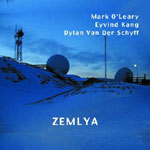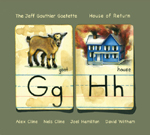Home » Jazz Articles » Multiple Reviews » Violin Quintet: Szilard Mezei, Return of the New Thing,...
Violin Quintet: Szilard Mezei, Return of the New Thing, Mark O'Leary, Gregor Huebner and Jeff Gauthier
 |  |  |  |  |
Szilárd Mezei As You Ayler 2008 | Return of the New Thing Alchemy Not Two 2008 | Mark O' Leary/Eyvind Kang/Dylan Van Der Schyff Zemlya Leo 2008 | Gregor Huebner New York NRG Quartet Niveau 2008 | Jeff Gauthier Goatette House of Return Cryptogramophone 2008 |
The violin has long been the central instrument in Western classical music—its numbers being the largest in orchestras and, as the head of the string section, the primary expressive voice for the kind of rhapsodic sensibility that informs European compositional tradition. Early jazz players like Joe Venuti, Stuff Smith and Stephane Grappelli extended this sensibility while allowing themselves room to extemporize. The violin has never quite become part of the standard jazz ensemble, but throughout jazz and new music history, players have found ways to utilize its sonorities. These five recordings show the violin as a voice of freedom, not merely a virtuoso centerpiece but a crucial part of some larger picture.
The Serbian Szilard Mezei, on viola and a kind of Balkan flute called a kaval, leads his quintet—Albert Markos on cello, Kornel Papista on tuba, Ervin Malina on bass and Istvan Csik on drums—through four very open and extended compositions in which the leader's instrument acts both as a powerful solo force and also as the vehicle for the musical colors and textures that burst out of the ensemble mix. It's fitting that As You should appear on the Ayler label; the music extends the visceral and often frenetic authority of the late saxophonist and his times.
Extended composition and improvisation are once again at the fore in Alchemy, the new recording by Return of the New Thing. This is a collective quartet with Paris-based American Dan Warburton on violin, Jean-Luc Guionnet on soprano and alto, Francois Fuchs on bass and Edward Perraud playing percussion. This is very much, as its group name implies, a declaration that the New Thing of the '60s remains a vital way to make music. Again, Warburton's violin is merely a voice in the overall collective improvisation. The music thunders and roars, causing a listener to pay attention to the way they define musical expression.
On Zemlya, guitarist Mark O'Leary, violist Eyvind Kang and percussionist Dylan Van Der Schyff explore a different sensibility, one that feels more open and attuned to sound possibilities—electronic and otherwise—as well as simpler textures. These players weave their spells more quietly but no less forcefully, and the spaces they open are every bit as communicative as the notes they play. There's an ethereal peace that pervades these works and the short pieces ease us into the longer improvisations. In the best ways, this recording suggests the openness of what has come to feel like the ECM approach—both in quality of music and brilliance of sound.
The group led by violinist Gregor Huebner on New York NRG Quartet creates some of the most 'conventional' jazz sounds of all the recordings in this grouping, but the music is no less striking for it. There's some beautiful solo work by pianist Luis Perdomo (most known for his work with Ravi Coltrane and Miguel Zenon) and certainly by the leader. Born in Germany but now living in New York, Huebner is a virtuoso with broad experience in large and small classical ensembles, as well as in a variety of other settings. The music here is multi-faceted and reflects both the leader's compositional skills and his ear for the works of others—notably Miles Davis, Kurt Weill, Richie Beirach and drummer Billy Hart who, along with bassist Hans Glawischnig, anchors the rhythm section.
Jeff Gauthier is also dealing with a more usual setting for House of Return but he and his associates—guitarist Nels Cline, pianist David Witham, bassist Joel Hamilton and drummer Alex Cline—throw enough curves to make this outing anything but ordinary. Take, for example, the leader's "Friends of the Animals." It's complex from the standpoint of form (it's a triple canon), and electronic effects also complement the quirky tune. The net result thus combines structure with a playful sense of freedom. All of these players are exceptional soloists, but they work together for maximum group communication in tunes that run the gamut from richly lyrical and poignant to odd and idiosyncratic. Gauthier is a volcanic composer and soloist and he demonstrates the violin's continuing vitality.
Tracks and Personnel
As You
Tracks: As You; Outside of the Game; Rain, Rain, Rain; Thistle.
Personnel: Szilard Mezei: viola, kaval; Albert Maarkos: violoncello; Kornel Pápista: tuba; Ervin Malina: bass; Istvan Csik: drums.
Alchemy
Tracks: 29.09; 24.41; 17.22.
Personnel: Jean-Luc Guionnet: alto sax, soprano sax; Dan Warburton: violin, piano; Francois Fuchs: bass; Edward Perraud: percussion.
Zemlya
Tracks: Zemlya; Vashon; Impish; Story of Iceland Pt 2; Karyobia; Sorcery; Kith and Kin; Meekong Delta Blues; Anorak.
Personnel: Mark O'Leary: guitar; Eyvind Kang: viola, processing; Dylan Van Der Schyff: drums, percussion, laptop.
New York NRG Quartet
Tracks: First Track; Second Track.
Personnel: Player Name: instrument; Player Name: instrument.
House of Return
Tracks: Biko's Blues; Friends of the Animals; I.O.A.; House of Return; Dizang; Satellites and Sideburns; Dissolution.
Personnel: Jeff Gauthier: violin, effects; Nels Cline: guitars, effects; David Witham: piano, keyboards, effects; Joel Hamilton: bass; Alex Cline: drums and percussion.
< Previous
Two Men with the Blues
Next >
Here & Gone
Comments
Tags
For the Love of Jazz
 All About Jazz has been a pillar of jazz since 1995, championing it as an art form and, more importantly, supporting the musicians who create it. Our enduring commitment has made "AAJ" one of the most culturally important websites of its kind, read by hundreds of thousands of fans, musicians and industry figures every month.
All About Jazz has been a pillar of jazz since 1995, championing it as an art form and, more importantly, supporting the musicians who create it. Our enduring commitment has made "AAJ" one of the most culturally important websites of its kind, read by hundreds of thousands of fans, musicians and industry figures every month.


















